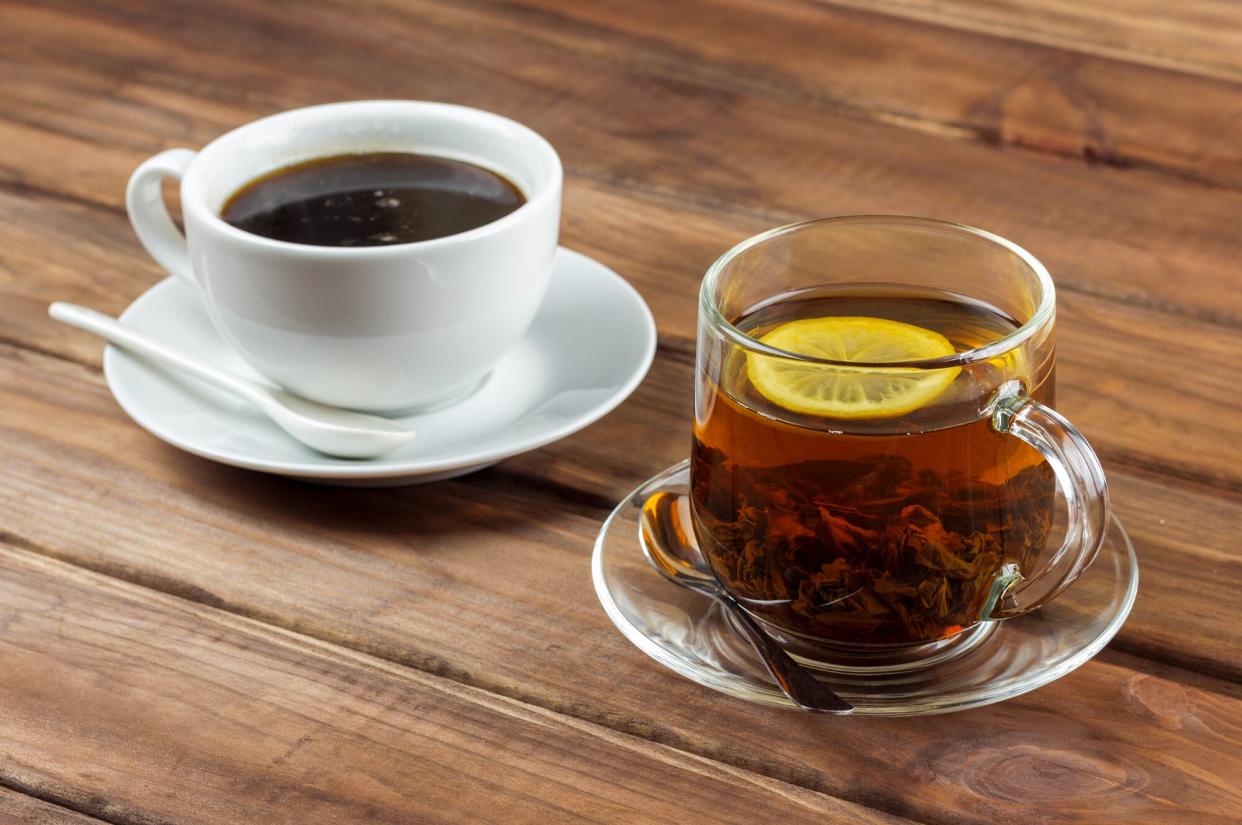Tea and Coffee Are Both Good Sources of Antioxidants and Caffeine, but Which Is Better for You?

Nikolay Ponomarenko / Getty Images
For many of us, starting the day with a drink is an essential morning ritual. And while some folks might opt for beverages like orange juice or plain water, most people reach for tea or coffee. These drinks, after all, are some of the most widely consumed beverages in the world. Even the act of consuming each brew offers its own unique experience. But when it comes to health and wellness, is one better than the other? To find out, we spoke to registered dietitians to find out which drink comes out on top.
Related: 10 Foods to Eat for Healthy Living
Health Benefits of Tea
Now, it's worth mentioning that are hundreds of types of tea. But tea, in general, is a wonderfully nutritious drink, especially when consumed regularly. For starters, it's teeming with antioxidants. A quick recap: Antioxidants are beneficial molecules that protect the body from free radicals, according to Harvard T.H. Chan School of Public Health. Free radicals are unstable atoms that, when present in high levels, can lead to oxidative stress. Over time, oxidative stress can damage cells and lead to chronic conditions like heart disease and cancer—but consuming plenty of antioxidants (like those found in tea) could potentially reduce your risk. Green and black tea are particularly rich in antioxidants called polyphenols, says Kelsey Lorencz, RD, registered dietitian and founder of Graciously Nourished. Even herbal teas, like peppermint and chamomile, have antioxidants, though in smaller amounts.
Both green and black tea also boast a moderate amount of caffeine, about 47 milligrams and 28 milligrams per 8-ounce cup, respectively. Caffeine has an energizing effect; this can be helpful for jumpstarting your day, whether you're heading to work or tackling chores. What's more, caffeine supports cognitive functions like learning and memory, according to a 2021 article in the journal Nutrients. And get this: Caffeine is an antioxidant itself, meaning it protects cells against oxidative stress, further adding to the health benefits of tea.
Health Benefits of Coffee
Coffee, like tea, is packed with antioxidants. It's most known for its high content of chlorogenic acid, an antioxidant compound that protects against oxidative stress, says Kerry Hackworth, MS, RD, registered dietitian at National Dairy Council. Chlorogenic acid also has anti-inflammatory and neuroprotective properties, which could play a potential role in staving off chronic conditions. In fact, drinking coffee is associated with a lower risk of neurodegenerative conditions like dementia and Alzheimer's disease. Furthermore, the brew may help slow muscle loss associated with aging, according to registered dietitian Maddie Pasquariello, MS, RDN.
And when it comes to caffeine? You can't go wrong with coffee. The brew contains more caffeine than tea, which might be ideal if you have a high tolerance to the substance. For context, one 8-ounce cup of brewed coffee contains 96 milligrams of caffeine, according to the Mayo Clinic. That's more than double the caffeine in black tea and four times as much in green tea.
So, Which Is Healthier: Tea or Coffee?
It depends. Both tea and coffee have notable health benefits for the body, and both drinks can be part of a healthy diet. Thus, the "best" option depends on what's most important to you.
For example, if it's the antioxidants you're after, either beverage can check that box. But if you're looking for something to soothe a bout of nausea, a cup of hot tea will be more likely to hit the spot. It also depends how you prepare each drink. For instance, if you want or need to limit excess sugar, drinking either beverage with a sweetener might not be ideal for your situation.
Another factor to consider is the caffeine content each drink, and how your body responds to caffeine. Remember, coffee has about two to four times more caffeine than tea—so if you're sensitive to the substance, tea may be a better choice, says Lorencz. Or if you can tolerate caffeine but find that coffee makes you jittery, you may be better off drinking matcha (a type of green tea) or black tea, which contain less caffeine, notes Pasquariello. Additionally, the time of day matters. "Caffeine has a long half-life, [meaning] it will remain in your system for hours after you drink it," says Pasquariello. So if you consume coffee or caffeinated tea in the afternoon, you might feel wired come bedtime. This can disrupt your ability to get quality sleep, which can be unhealthy and stressful for the body.
Most importantly, think about your own personal health concerns. Some medications and conditions, such as irritable bowel syndrome, might not play well with large amounts of caffeine. This means you might need to limit or skip highly caffeinated drinks, such as coffee. Likewise, if you're trying to become pregnant, currently pregnant, or breastfeeding, you'll need to limit your caffeine intake, notes Hackworth. This might mean drinking coffee or tea in certain amounts, though "it's always best to consult a doctor or registered dietitian for individualized advice," she adds.
Finally, it's worth considering which drink simply brings you joy. After all, whether it's a bold cup of joe or an earthy green tea, these small, everyday pleasures are crucial for your well-being. And by acknowledging how each drink fits into your lifestyle, health, and overall needs, you can determine which one works best for you.
